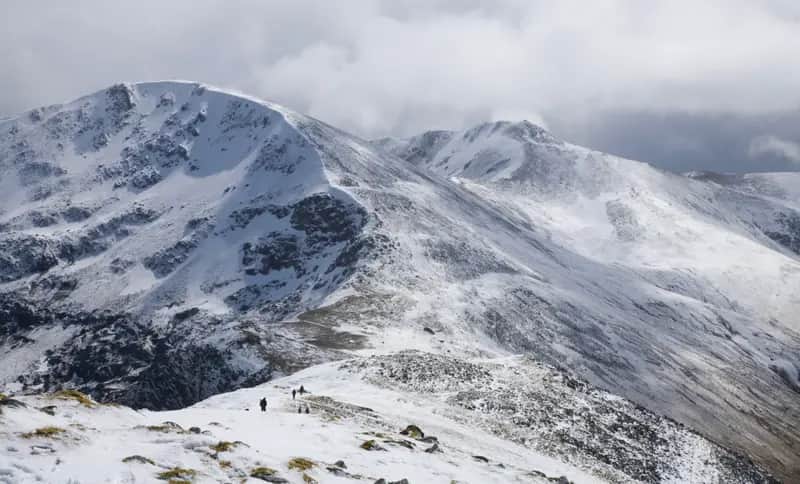TEAMWORK IS KEY IN MOUNTAIN RESCUE – ON AND OFF THE HILL

TROUBLE SPOT: The peaks of the Ben Cruachan ridge on a blue sky winter day – a different proposition to that faced by rescuers

SAFETY POINT: The way ahead
THERE I was, feeling quite chuffed about the fact that last year's fund-raising efforts for Scottish Mountain Rescue had pulled in more than £600.
Then along comes Mr Ed Byrne, who announces he's donating his £22,500 winner's cheque from the ITV quiz show, The Chase, to the cause. Thanks Ed.
Suddenly my contribution didn't seem so impressive. It did, however, provide hours of amusement for my daughters. Who needs to tell jokes when you can just upstage everyone else with the flick of a pen?
Joking aside, it was a wonderful gesture from Ed, a man who enjoys the mountains of Scotland every time he has the opportunity. We have still to meet up for that night-walking date, so I'll have a word with him then.
And I would like to once again offer a big thank-you to everyone who bought a Moonwalker 2020 calendar, second-hand books or simply put money in my MR tin. The final total of £637.92 was the highest annual amount since I started collecting around five years ago.
It seemed appropriate to hand over the cheque at Holyrood on Tuesday during a Scottish Parliamentary reception celebrating those who provide safety information, training and rescue services on our mountains.
The event, Delivering World Class Mountain Safety and Rescue for Scotland's Outdoors, was attended by MSPs, Scottish Mountain Rescue and Mountaineering Scotland, as well as volunteers and professionals from the many other organisations and clubs that contribute to the nation's economy and well-being.
We are fortunate to have such a world-class set-up, and it was uplifting in these days of increased political and social polarisation to see such cross-party support for the work carried out by the mountain community.
Like so many walkers and climbers, I have had occasion to be grateful to our rescue teams: I had to be helped off Tryfan in Wales after wrecking my ankle ligaments in a fall, and our group will be forever indebted for the Glencoe team's professionalism in recovering the body of a good friend from Buachaille Etive Mor.
There's a danger of equating the rescue teams as almost superhuman, in failing to realise that behind all the expertise, dedication and selflessness these are ordinary people with ordinary lives but managing to fit in sometimes extraordinary work. Every MR member has tales to tell, but it was particularly informative to hear Damon Powell, the current chair of SMR, relate a story of one rescue on Ben Cruachan.
The operation itself threw up all the expected challenges; initial information that can't be wholly relied on, weather conditions dictating routes and possible helicopter help, and the balance between making good time and the condition of the casualty. Finding this victim hanging upside down by one ankle below the main ridge involved some interesting problem solving, but in the end all turned out well.
The call-out had come at 6.30pm, the rescue was wrapped up at 2.30am, and Damon was home for 4.30am. Some 15 team members were involved, and as fatigue was starting to set in on the descent with the stretcher, there was relief in the form of another team arriving to provide needed respite.
But behind the scenes there is teamwork of a different kind. Apart from being a rescuer, Damon is a husband and father, and there are always family considerations when there's a call-out. The support he gets from his wife and children, from helping get his gear sorted out to making sandwiches to just being there, is vital.
Rescue teams are not just there for the mountains. They are called out on many other occasions – searching for elderly or vulnerable people, for instance – and sometimes it can take a toll, mentally as well as physically. It's encouraging to see so many people chasing a healthier lifestyle and getting out into the great outdoors at a time when obesity and mental health issues are so prevalent.
But as more and more take to the hills, it's inevitable the number of incidents will rise. Call-outs were up by 53 per cent between 2017 and 2018, and in the latter there were 29,091 hours spent on rescues with 851 people assisted. Last year, there were roughly two call-outs per day, with 685 recorded incidents.
Education is essential, and there's a continuing need to encourage a merging of a love for the outdoors with the responsibilities and health benefits that go hand in hand with a more active lifestyle.
Technology can play its part – the increasing use of drones is one example – to help in search and rescue. Every single one of us who ventures out on the hill should fight tooth and nail to show how we value those who will be there for us any time of night or day.
The numbers don't lie – the pictures posted every day on social media show a booming interest, and many of you provide regular and generous financial support. If every mountain user were to donate even a small amount each year, it would be a massive statement of intent as well as a fitting gesture of appreciation.

